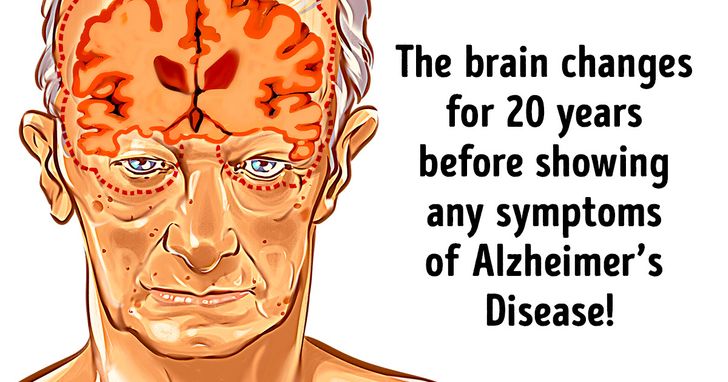Alzheimer's is classified as an irreversible disease, which means that once you have it, you can never go back to the way you were before. There are millions of people diagnosed with Alzheimer's disease each year, with the statistics reaching 32% of the elderly being affected. According to a recent scientific study, the brain of someone with Alzheimer's disease changes 20 years before any symptoms occur.
Here at Bhaskar Health, we researched various ways to prevent Alzheimer's disease and gathered a list of things that we should all start doing at a relatively young age.
1. Exercise regularly.
Regular exercise can reduce the risk of Alzheimer's disease up to 50%, according to the Alzheimer's Research Foundation. Not only does physical activity keep the blood flowing but it also increases chemicals that protect the brain. Exercise also tends to lessen some of the natural reduction in brain connections that occurs with aging.
- Exercise at least 150 minutes per week: Incorporate some cardio and strength training in your routine. If you are just starting out, you can try swimming or walking.
- Start lifting weights to build muscle and pump up your brain: Add 2-3 sessions of weight-lifting per week. This will increase muscle mass and aid in maintaining brain health.
- Balance coordination exercises: These exercises will give you great balancing skills using the majority of your muscles to keep you from falling over and staying agile.
2. Socialize.
Human beings are naturally social creatures. We like attention and communication and we never thrive for isolation. Staying socially engaged can actually protect our brain against Alzheimer's disease. It is important to maintain and also develop strong social networks with people in order prevent Alzheimer's. Not only will that benefit the brain, but also our mental health.
If you believe you are becoming more isolated as you grow older, here are a few things you can do to become more social and meet new people:
- Join a social group or a class.
- Visit the local community center.
- Take some classes on a subject that interests you.
- Volunteer.
- Meet your neighbors.
- Go out more often (movies, parks, cafes, etc...)
3. Improve your diet.
Alzheimer's is usually described as "diabetes of the brain." This is because some evidence shows a strong link between metabolic diseases/disorders and the signal-processing system. In Alzheimer's disease, the presence of inflammation and insulin in the body resists injured neurons and prevent communication between brain cells. By adjusting to a healthier diet, you can help reduce inflammation and protect the brain.
- Reduce sugar: Avoid sugar and simple carbohydrates such as white flour, pasta, white rice, or anything with added sugar because this leads to dramatic spikes in blood sugar levels which then causes inflammation in the brain.
- Avoid hydrogenated oils: Trans fats can cause inflammation and they also produce free radicals, both of which are very harmful to the brain. Try to reduce the consumption of fast food and pre-packaged food.
- Consume more OMEGA-3s: The DHA found in omega-3 fatty acids can help prevent Alzheimer's disease and dementia by reducing beta-amyloid plaques.
- Enjoy a cup of green tea: Regular consumption of green tea can enhance alertness and memory which slows down the aging of the brain. Drinking 2-3 cups of tea can benefit your brain health in the long run.
- Get some dietary supplements: It is proven that a diet rich in B-12 vitamins and folic acid can prevent Alzheimer's since they are the vitamins responsible for DNA formation and maintaining healthy nerve cells and red blood cells.
ALWAYS talk to your doctor before starting any supplements!
4. Mental stimulation
Research suggests that people who keep trying to educate themselves and obtain more knowledge about various subjects are less likely to develop Alzheimer's disease or dementia than those who do not. There are various stimulating activities and brain games that can be easily incorporated into a daily lifestyle in order to ensure maximal mental stimulation.
- Practice memorization: Start with something that is simple, for example, pairing items with peg words, forming images, memorizing number lists, making associations, and linking items on a series to form a list.
- Practice the 5 W's: Try to observe, question and describe like an investigator. Make the list of "What, Who, When, Where and Why" part of your daily routine. Capturing these details will keep your neurons active and stimulated.
- Learn something new: Try and learn a new language, start a new hobby, or study the history and culture of a different country. Read the newspaper everyday or an informative book. The greater the challenge, the greater the benefit.
- Start playing strategic games: Strategic games, puzzles, and brain teasers provide a great mental workout. They build on the brain's capacity to form and hold on to cognitive associations. Try some crossword puzzles, playing cards, board games, and word/number games such as Sudoku and Scrabble.
- Do it differently: Routine and repetition create muscle memory which makes your brain less active when it comes to doing various things. Trying something new will stimulate and sharpen your brain. For example: take a completely different route, or rearrange your files, do things with your non-dominant hand, or try writing things down backward. Change your habits regularly in order to create new pathways.
5. Get enough quality sleep.
It is very prevalent for people who suffer from Alzheimer's disease to experience insomnia and other sleep problems. A new study has shown that disrupted sleep is not, in fact, a symptom of Alzheimer's Disease, but it is, instead, a risk factor.
Poor sleep equals higher levels of beta-amyloid – which is a brain-clogging protein that prevents deep sleep (REM Sleep) which is responsible for memory formation. If the lack of sleep affects your thinking and your mood, you have a greater chance of developing Alzheimer's disease.
- Reconsider napping: Even though taking a nap is a great way to recharge, it worsens your insomnia. If you are suffering from insomnia, avoid napping altogether and wait to recharge your batteries at the end of the day.
- Build a relaxing evening ritual: One or 2 hours before you go to bed is the ideal timeframe to mentally prepare your brain for sleep. The best way to do it is to turn the lights down significantly and maybe light some candles to set the mood. Take a long relaxing bath to get rid of toxins in your body and try to read a book, but keep it light. When this ritual becomes a habit, your brain will interpret it as a signal that it's time to sleep.
- Create a sleeping schedule: Try to reinforce your natural circadian rhythms by going to bed and waking up at the same time every day. This way, your brain's clock will respond to regularity.
- Mute your inner voice: Sometimes stress, anxiety, negative emotions, or even just the fact that our brain is not mentally prepared for sleep, we start hearing our inner voice asking random questions and it keeps us awake. If you find yourself in one of those situations, its better to get up circle the room a couple of times, try reading something that you find relatively boring, and then go back to bed. DO NOT at any of these moments, look at your phone as it will keep you awake.
6. Manage your stress.
Anxiety and chronic stress can take a heavy toll on the brain and that can lead to shrinking in parts of the memory area. This then prevents nerve cell regrowth and increases the risk of Alzheimer's disease and dementia. When we get stressed, we produce a protein called beta-amyloid which is responsible for the massive neuronal cell death that accompanies Alzheimer's.
- Cherish your inner peace: By taking care of yourself mentally, you'll be able to keep stress and anxiety away. Try meditating, praying, reflecting and maybe going for a walk. These methods can make you immune to the daily effects of stress.
- Breathe: Whenever you feel your anxiety taking over or when you feel that you are overwhelmed, combat your stress by taking deep breaths. This can be a great method of stress relief and will give you a sense of calmness and peace.
- Use your humor: Being sarcastic can have a lot of benefits to your health. Laughing at yourself and not taking everything too seriously can help the body fight stress.
- Have some fun: Not everything has to be about work or money. Schedule more fun in your daily routine. Find leisure activities that you can incorporate into your life to escape your work routine. Whether this is playing the piano, painting, or making soap.
A few more tips to reduce the risk of Alzheimer's disease:
Always remember what Juneval the Roman Poet wrote about the body: "Mens sana in corpore sano" which means "what's good for the body is good for the brain: and vise versa.
- Quit smoking: A study showed that smokers over the age of 65 are 80% more likely to develop Alzheimer's disease and dementia than those who do not smoke. When you quit smoking, you get more oxygen to your brain and that helps improve circulation.
- Eliminate drinking: Even though it is recommended to consume a glass of white or red wine once in a while, heavy alcohol consumption can increase the risk of Alzheimer’s disease as it promotes premature aging of the brain.
- Keep an eye on your weight: A recent study has found that middle-aged people who were overweight are 50% more likely to develop Alzheimer's disease and other forms of dementia than those who were not overweight. So losing weight will be a great way to protect your brain.
Do you know any other ways to prevent Alzheimer's disease and dementia? Please share them with us in the comment section below! And remember: Healthy Body = Healthy Mind!










0 Comments